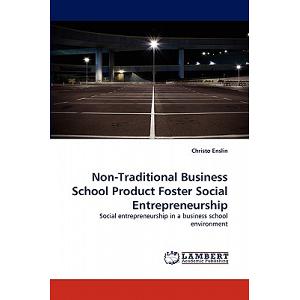Typology of Ventures explained the 4 types of entrepreneurship:
1. The primary difference between traditional entrepreneurship and social entrepreneurship is the intended mission.
Traditional entrepreneurship; the venture mission is profit and the primary market impact is for profit.
Social entrepreneurship; with a mission to solve pressing social problems such as: education, healthcare, global warming, global water shortage and energy.
2. Social purpose entrepreneurship; to solve social problem and for profit.
For example:
• Jim Poss founded Seahorse Power Company with the aim of building an enterprise that would help the environment. And At the same time, the economic impact of his Big Belly solar trash compactor is driving sales and the growth of his company.
3. Social consequence entrepreneurship; the venture mission is for profit and the primary market impact is for social.
For example:
• The body shop founded by Dame Anita Roddick , produced the natural beauty products has increase their sales all around the world. At the same time, they have values to activate self – esteem, against animal testing, support community trade, protect the planet and defend human right.
4. The enterprising non – profits entrepreneurship; the venture mission is for social and the primary market impact is for social.
Two types of non – profits entrepreneurship:
• Earned – income activities: to generate all or portion of total revenue to sustain their mission – driven organization.
• Venture philanthropy funding, is a blend of financial assistance with high level of professional engagement by the funder.
For example:
• KickStart International founded by Martin Fisher and Nick Moon is an example of an enterprising nonprofit using earned – income activities and venture philanthropy. Their micro – irrigation pump known as the MoneyMaker is the low cost irrigation system has helped rural farmers in Kenya increase their crops production, allowing the farmers to produce crops not only for family survival but for profitable return.
Reference:
Jeffry A. Timmons, Stephen Spinelli, Jr (2009), New Venture Creation, Entrepreneurship for the 21st Century; 8th Edition, McGraw Hill International Edition. (JTSS)
1. Traditional entrepreneurship
2. Social Purpose Entrepreneurship
3. Social Consequence Entrepreneurship
4. Enterprising Non-Profits Entrepreneurship
2. Social Purpose Entrepreneurship
3. Social Consequence Entrepreneurship
4. Enterprising Non-Profits Entrepreneurship
 |
| Non-Traditional Business School Product Foster Social Entrepreneurship |
Traditional entrepreneurship; the venture mission is profit and the primary market impact is for profit.
Social entrepreneurship; with a mission to solve pressing social problems such as: education, healthcare, global warming, global water shortage and energy.
2. Social purpose entrepreneurship; to solve social problem and for profit.
For example:
• Jim Poss founded Seahorse Power Company with the aim of building an enterprise that would help the environment. And At the same time, the economic impact of his Big Belly solar trash compactor is driving sales and the growth of his company.
3. Social consequence entrepreneurship; the venture mission is for profit and the primary market impact is for social.
For example:
• The body shop founded by Dame Anita Roddick , produced the natural beauty products has increase their sales all around the world. At the same time, they have values to activate self – esteem, against animal testing, support community trade, protect the planet and defend human right.
4. The enterprising non – profits entrepreneurship; the venture mission is for social and the primary market impact is for social.
 |
| How to Write a Business Plan: Win Backing and Support for Your Ideas and Ventures |
Two types of non – profits entrepreneurship:
• Earned – income activities: to generate all or portion of total revenue to sustain their mission – driven organization.
• Venture philanthropy funding, is a blend of financial assistance with high level of professional engagement by the funder.
For example:
• KickStart International founded by Martin Fisher and Nick Moon is an example of an enterprising nonprofit using earned – income activities and venture philanthropy. Their micro – irrigation pump known as the MoneyMaker is the low cost irrigation system has helped rural farmers in Kenya increase their crops production, allowing the farmers to produce crops not only for family survival but for profitable return.
Reference:
Jeffry A. Timmons, Stephen Spinelli, Jr (2009), New Venture Creation, Entrepreneurship for the 21st Century; 8th Edition, McGraw Hill International Edition. (JTSS)


No comments:
Post a Comment